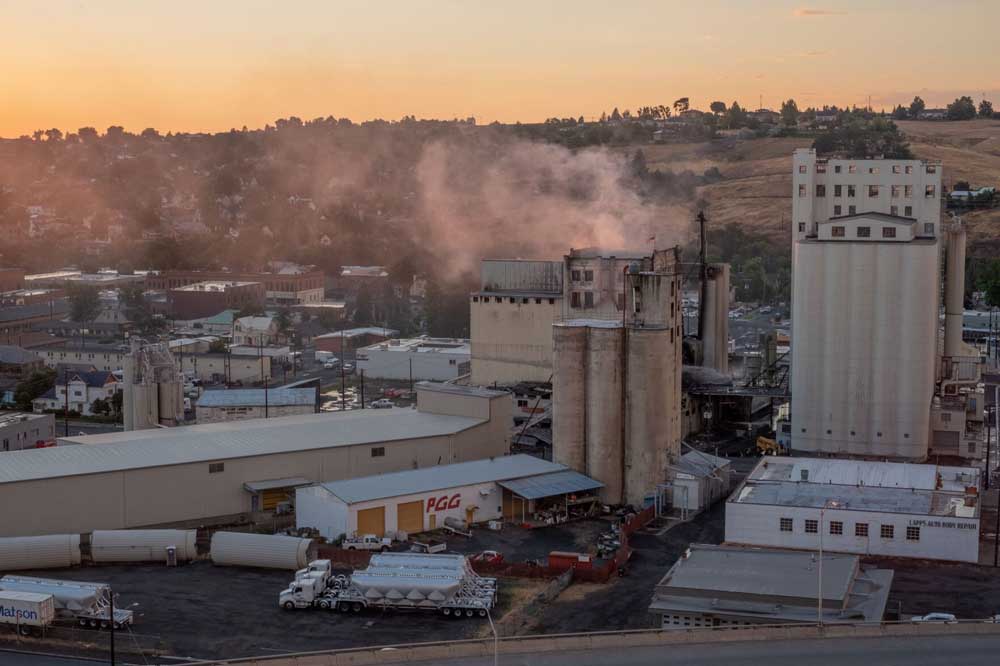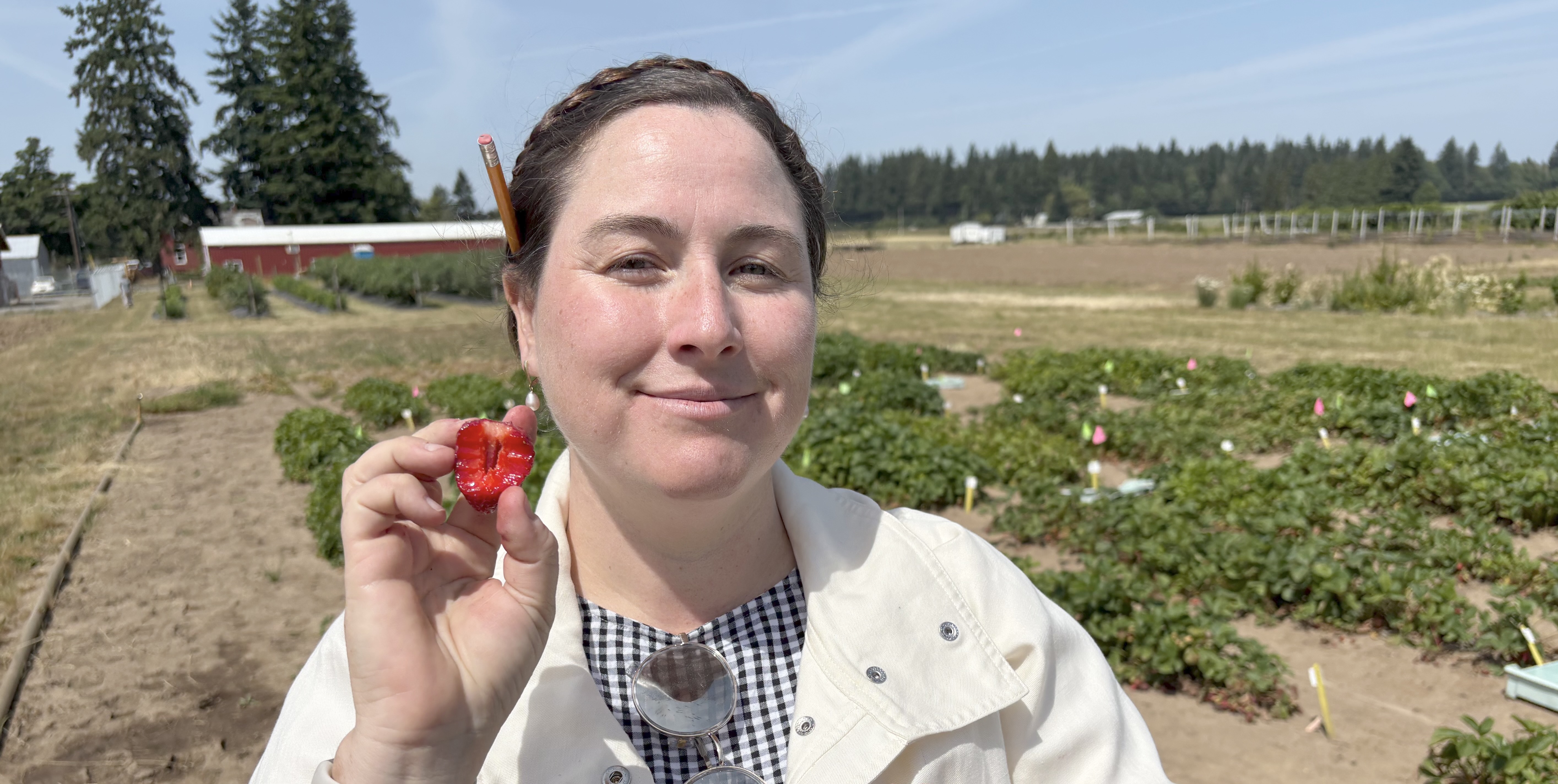Pendleton Flour Mills history might have started with a card game
Published 10:45 am Monday, August 29, 2022

- Smoke continues to rise Aug. 10 from the Grain Craft flour mill as the sun sets in Pendleton.
PENDLETON, Ore. — Tony Flagg was vice president for grain operations and chief executive officer of Pendleton Flour Mills for 20 years.
A former employee of prominent 20th century entrepreneur Henry Collins once told Flagg that Pendleton Flour Mills began with a card game in the Club Cigar Saloon, on the east side of the 100 block of South Main Street.
“He said Collins was an itinerant salesman,” Flagg recalled, “selling pots and pans. He won his first flour mill and a small grain business on a poker hand. It grew large by the late 1920s and ’30s. The 100-year-old card game for geezers was still going on in the 1980s.”
Roots of the mills
Collins was born in Hillsboro in 1884 and wed Bertha Alexander in Pendleton in 1911. His 1970 obituary in The Oregonian said he attended the University of Puget Sound and business school in Mankato, Minn. Thus, there may be reason to doubt his employee’s poker game story.
The obituary credits Collins with a lifelong career in the Western grain market, including West Coast manager for Continental Grain Co., and vice president, director and director emeritus of food processing and commodities trading giant Archer Daniels Midland Co.
He built Collins Flour Mill in Pendleton in 1919, and kept it until 1937. Collins served as Pendleton Round-Up Association president from 1921 to 1932, and as Oregon State Racing Commission chairman from 1937 to 1947. He owned several race horses, retiring in 1962.
Pendleton Flour Mills’ roots reach back to 1910, according to Grain Craft, which was formed by a merger in 2014. The company sold bagged flour in the Pacific Northwest under the name Fisher Flour.
“When the flour mill started, it was limited to soft white wheat,” Flagg said. “Every little town had a small mill. It would bag up the flour and ship it overseas.”
Soft white wheat goes into cakes and pastry, Asian noodles or Middle Eastern flatbreads.
“Asian countries built their own mills in the 1930s, so we shipped them bulk grain rather than flour,” Flagg said. “Most of the little mills went out of business. There’s a picture of a flour mill convention in Spokane around 1910, with 50 or 60 guys on a street corner in their bowler hats. We went from 60 mills down to four. Pendleton Flour Mills was one of the survivors.”
PFM developed a strong distribution network, which evolved to specialize in bulk shipments via trucks, rail and ocean containers.
Mills change hands
Igleheart Brothers, a milling subsidiary of General Foods Corp., bought Pendleton Flour Mills, and sold it to Kerr Pacific in the 1970s. Kerr’s flour mill in Helix burned down in 1969, leaving the company with only its operation in Hawaii.
“After the fire, Kerr approached General Foods to buy Pendleton Flour Mills,” Flagg said. “But General Foods couldn’t stand old man Kerr. They won the right to purchase in a lawsuit in the late ’70s.”
Flagg joined Kerr Pacific-owned PFM in 1983, as vice president for grain operations. He became CEO of the whole company in the late ’80s. Flagg pioneered ground storage of grain on land leased from the Confederated Tribes at Mission.
“In 2003, I mergered and acquired myself out of a job,” he said.
In 2001, Pendleton Flour Mills formed a joint venture with Milner Milling of Chattanooga, Tennessee. Also that year, the mills acquired Fisher Mills Inc. of Washington.
Milner Milling acquired Cereal Food Processors in 2014, when it was the nation’s largest independent flour milling operation, with 10 mills from Portland to Cleveland. PFM and Milner then formed Grain Craft that year.
Flagg moves on
Flagg left PFM for the pasta and ethanol businesses, then to serve as chief executive officer of United Grain, where he continued to pioneer ground storage.
“I learned two lessons the hard way,” Flagg said. “First, put down an asphalt pad. Second, don’t build a pile larger than one million bushels. If you have to get the grain to market all at once, you take the tarp off and during the time it takes to load out a two million bushel pile, it might rain. In fact, if I’m the one moving the grain, it will rain. Grain is often sold in the winter or early spring, when it’s rainy.”
Flagg is happy to live in Pendleton again, despite the heat waves this summer.
“We have family and friends here,” he said. “Florida is hot, humid and buggy, with hurricanes. I feel as if I’ve died and gone to heaven.”






